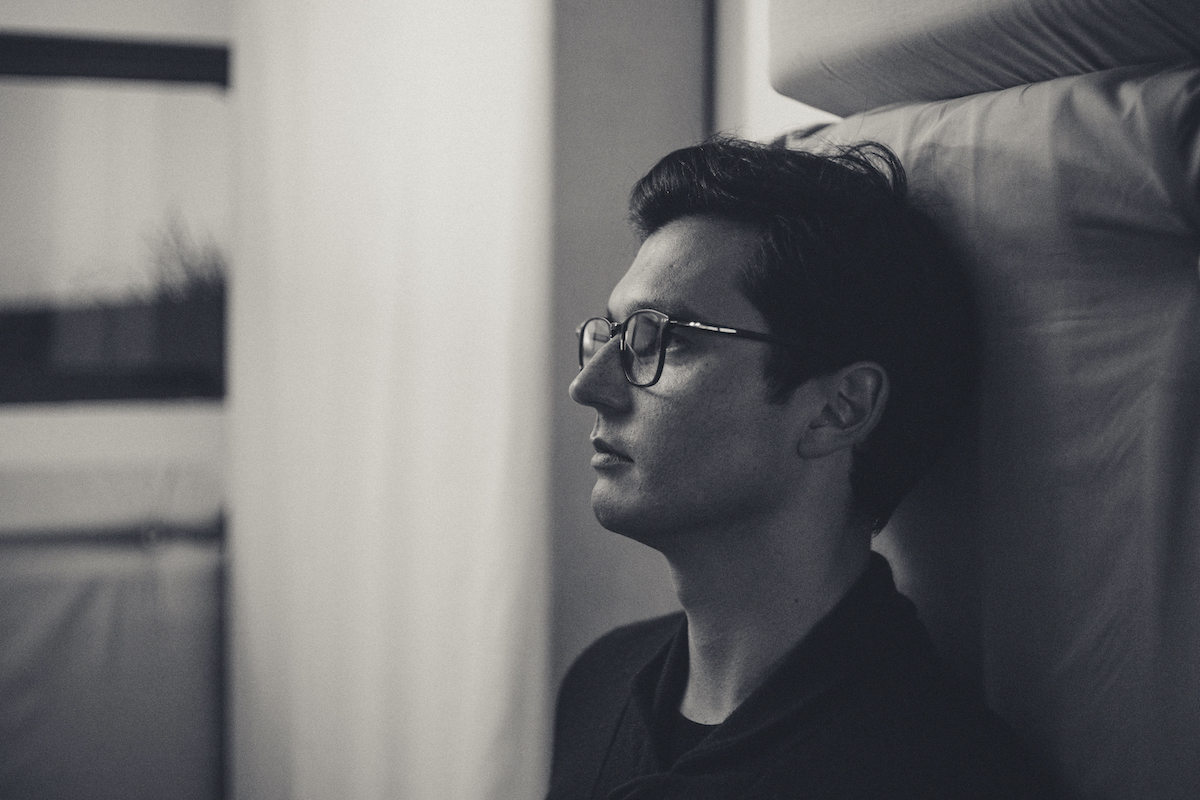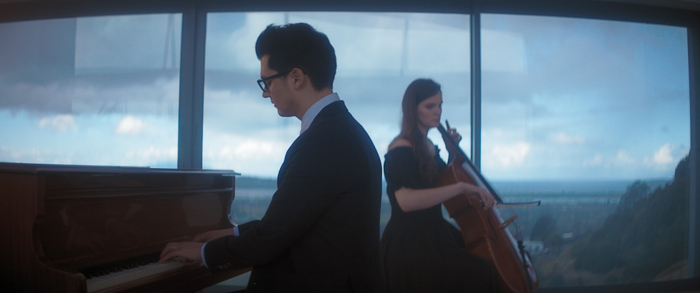
Breaking the Silence - Composer Levi Patel’s journey to find his voice
By Jeremy Redmore
Cresting the blind ascent that caps the journey to Levi Patel’s remote studio, one cannot help but come to the awestruck understanding that this setting has played a significant role in inspiring what has been a remarkable creative output over the past decade.
I first made this journey to Levi’s coastal paradise, about an hour north of New Zealand’s biggest city, in the role of musical collaborator in 2019; myself as pop singer and songwriter, Levi as composer and arranger.
We had only known each other through our respective musical releases but soon found common ground in the Oliver Sacks, Hannah Arendt and Philip Larkin carefully aligned on his studio bookshelf, favourite albums by Sigur Rós, Nick Cave and Ólafur Arnalds and the birds migrating past his hilltop home.
Alongside this common ground, I also discovered the surprising extent of Levi’s artistic history. Not just a prolific modern classical composer, Levi had engineered and exhibited robotic guitars at New York’s Museum of the Moving Image, travelled to George Lucas’ esteemed Skywalker Ranch to work with an Academy Award winning sound editor and had gone viral on Chinese social media.
Of course, like most Kiwis you meet, Levi’s natural modesty meant that this information was slow to emerge and so, when he mentioned he was releasing a new solo album that featured his voice for the very first time, I selfishly offered to write this article with the hope that even more layers of this understated artist’s world could be revealed.

Over the course of many collaborations, three EPs and two albums, the closest Levi has come to singing on a track has been heavily affected backing vocals; and he freely admits that that approach suited him perfectly.
“I still remember the liberation I felt when I realised, as a teenager, that my music didn’t need to have vocals… It meant an end to struggling to write lyrics and battling with singing. I was free to focus on the parts that came naturally to me,” Levi says.
So what inspired this drastic change to his status quo? What made an unnatural source of expression suddenly spring to life?
“I suppose I’ve joined the ranks of more stereotypical artists, because this all came about after a break-up,” Levi recalls.
“The words I was writing, as a kind of emotional journal, soon started attaching themselves to music. I describe it like that because I honestly had no intention of doing any of this, music can be strange, but I had accidentally started writing songs that needed the story and melody of a vocal to feel complete.”
As an outside observer of Levi’s work, this progression seemed much more natural after witnessing his songwriting and production collaborations with both myself and pop soulstress Alayna over the past few years. There, one can easily see his natural affinity for both creating space for vocals and augmenting their emotional impact via string arrangements and affected textures.
But for Levi, this new album, fittingly titled Sailing on the Light of a Passing Star, seems other-wordly.

“In the past, unless I was working on a song, my ears would often gloss over the lyrics, my attention diverted by the sound.
“Now, I’m working on an album I never could have imagined and finding so much reward in everything my younger self cast aside.”
As a singer myself, I fully understand what’s required to write and record a dynamic set of songs for an album, so I was intrigued to know just how Levi took his admittedly-underused set of pipes and turned them into an instrument that stood up to his meticulous musical standards.
“After having worked with so many amazing singers over the years, when I started recording my own vocals at the start of the album process, I could hear exactly what I didn’t like.
“I knew the tone wasn’t right and it was also really difficult - and you could hear that in the recordings.
“More than any other skills I’ve learned, I think with singing, the more I improved, the easier, more rewarding and fun it became.”
Helping Levi with this process was a legend of the New Zealand music scene, Suzanne Lynch, who - having sung and recorded with Cat Stevens in the early 1970s - certainly knows the joy to be found in singing and unlocking that gift within aspiring vocalists.
“Starting this project took a lot of blind faith. When I went to my first session with Suzanne I just had to hold on to a stubborn belief that I would one day be good enough to sing on my album without undermining the instruments,” Levi says.
“Months of weekly lessons, paired with intense daily exercises, eventually brought me to a place where my voice’s tone and range could match the vision I had in my mind for these songs.
“But a couple of years later, after completing the rest of the production, it came time to record the final vocals; and I found I just couldn’t sing the way I wanted anymore.
“So I went back to Suzanne for an extremely intensive training period, until I regained my skills and vocal fitness, and finally, for the first time, reached a point where I could fully express the depth of emotion I felt in the songs.”
The result of all this hard work is an album that seamlessly and beautifully combines his proven composition and production skills with a more traditional singer-songwriter sound; adding another string of skills to an already impressive bow.
“I came away from the experience with a huge new sense of freedom and creative expression within my voice, one that I know I can now lean into as part of my regular songwriting process.”
And somehow, amidst writing, producing, engineering and performing almost the entirety of a new album centred around the journey from grief to hope, I was surprised to learn he’s found a new love: Mandarin Chinese.

I myself prefer the simple, fruity variety of Mandarin, but Levi relishes the depth and complexity of this ancient language; and with thousands of videos on Chinese social platform Douyin already featuring his music, Levi hopes to test the full range of his abilities within a part of the world he has a strong affinity for.
“Firstly the language is incredible, I feel like it really clicks with my brain somehow and learning it is helping me unlock immense cultures that are largely unknown to the western world.
“It was incredible to discover all these people connecting with my music, and deeply engaging with it, that I had no idea existed before.
“One thing I’ve discovered is that many of them seem to love highly-emotive music, which I think this album and my core strengths as a songwriter and producer really align with.
“So it would be an absolute dream to one day collaborate with musicians from the Mandarin-speaking world and create some beautiful music together.”
Discovering the turning of these new leaves in Levi’s world have left me doubly excited for the release of lead single Gravity and the ensuing album.
As I wave goodbye to him and his remarkable slice of New Zealand paradise, I push play on my advance copy of Sailing on the Light of a Passing Star and let its story, melodies and textures perfectly soundtrack my dusky drive home.
This time, it’s a journey within the confines of little old New Zealand, but I can certainly imagine a very near future where Levi Patel’s gorgeous songs will accompany similar drives and commutes in far-flung cities and towns across the world.
Jeremy Redmore has worked as a writer and editor for major New Zealand media outlets such as TVNZ, Stuff, NZ Herald and Newshub for over 20 years; alongside his own successful music career.




